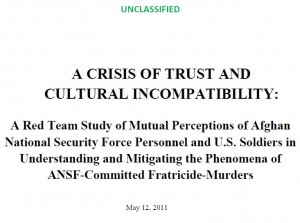Son Of “Dumbest Fucking Guy On The Planet” Shills For More War In Afghanistan And Elsewhere
Old craven chickenhawks don’t die, they just breed chickenshit progeny. And so it is with Douglas Feith, famously, and arguably correctly at the time, labeled “the dumbest fucking guy on the planet” by no less than real military man General Tommy Franks. A dilettante son of a “Revisionist Zionist”, Doug Feith went to Harvard and Georgetown Law instead of war when his country actually was at war. Now, granted, I didn’t fight in Vietnam either, thankfully; however, unlike Doug Feith, I did not carve out a career of belligerently advocating for wars of aggression for the sons and daughters of my generation to kill and die in. Feith’s record on hawking the Iraq war, and other neo-con aggressive military action, is legend, and it is exactly what earned him his enduring moniker from Gen. Tommy Franks.
Which brings us to the chickenhawk’s chickenshit progeny. That would be David Feith, the “assistant editorial features editor” at the Wall Street Journal. Feith the younger took today to the pages of the Wall Street Journal to shill for once and future hawkish US warmaking and the proposition that “victory” can be had in Afghanistan if we just keep on killing and dying. David Feith’s vehicle for this attempt is surgemeister Gen. H.R. McMaster:
The political and psychological dimensions of warfare have long fascinated the general, who first became famous in the Army when he led his vastly outnumbered tank regiment to victory at the Battle of 73 Easting in the first Gulf War. Six years later, he published “Dereliction of Duty,” based on his Ph.D. thesis indicting the Vietnam-era military leadership for failing to push back against a commander in chief, Lyndon Johnson, who was more interested in securing his Great Society domestic agenda than in doing what was necessary—militarily and politically—to prevail in Southeast Asia. For 15 years it’s been considered must-reading at the Pentagon.
But Gen. McMaster really earned his renown applying the tenets of counterinsurgency strategy, or COIN, during the war in Iraq. As a colonel in 2005, he took responsibility for a place called Tal Afar. In that city of 200,000 people, the insurgents’ “savagery reached such a level that they stuffed the corpses of children with explosives and tossed them into the streets in order to kill grieving parents attempting to retrieve the bodies of their young,” wrote Tal Afar’s mayor in 2006. “This was the situation of our city until God prepared and delivered unto them the courageous soldiers of the 3d Armored Cavalry Regiment.”
What is most interesting about David Feith’s interview with the once and future hawk H.R. McMaster is that it seems to be Feith, not McMaster, that longs for the US to keep going for “the win” in Afghanistan and parlay into future war. McMaster talks in terms of the Afghanis curing their corrupt society, and of the US additions to the inherent problems in the Afghan culture:
“We did exacerbate the problem with lack of transparency and accountability built into the large influx of international assistance that came into a government that lacked mature institutions.”
McMaster also talks of the desires and powers growing in the Afghan nation to right their own ship. In fact, if you separate McMaster out from Feith, you actually get some semi-intelligent perspective.
But not from Feith. Oh no. Instead, Feith tries to lead McMaster by the bit right back to more US warmaking:
Near the end of our interview, we turn to the future of American warfare. U.S. troops are scheduled to end combat operations in Afghanistan in 2014, perhaps sooner. Focus is turning from the Middle East to East Asia, and to the air and sea power required in the Pacific.
McMaster refuses to bite on Feith’s apple, in spite of Feith’s determination to hold it out. Neo-con apples fall not far from the tree, and David Feith dropped particularly close to “the dumbest fucking guy on the planet”.

